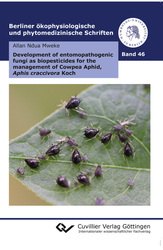| Departments | |
|---|---|
| Book Series (97) |
1382
|
| Nachhaltigkeit |
3
|
| Gesundheitswesen |
1
|
| Humanities |
2372
|
| Natural Sciences |
5408
|
| Mathematics | 228 |
| Informatics | 320 |
| Physics | 980 |
| Chemistry | 1364 |
| Geosciences | 131 |
| Human medicine | 243 |
| Stomatology | 10 |
| Veterinary medicine | 108 |
| Pharmacy | 147 |
| Biology | 835 |
| Biochemistry, molecular biology, gene technology | 121 |
| Biophysics | 25 |
| Domestic and nutritional science | 45 |
| Agricultural science | 1005 |
| Forest science | 201 |
| Horticultural science | 20 |
| Environmental research, ecology and landscape conservation | 148 |
| Engineering |
1798
|
| Common |
98
|
|
Leitlinien Unfallchirurgie
5. Auflage bestellen |
|
Advanced Search
Development of entomopathogenic fungi as biopesticides for the management of Cowpea Aphid, Aphis craccivora Koch (Volume 46) (English shop)
Allan Ndua Mweke (Author)Preview
Extract, PDF (730 KB)
Table of Contents, PDF (670 KB)
Cowpea aphid (Aphis craccivora Koch) is a major pest of cowpea, an important African Indigenous Vegetable (AIV) in tropical Africa. Cowpea leaves are a popular delicacy providing daily balanced dietary requirements for millions of people. Synthetic chemicals are first choice management strategy for this pest despite their associated risks of food safety, environmental pollution, and development of resistance by the pest. Consumers are increasingly demanding less use of pesticides and this had led to search of alternative pest management products. This study has identified an environmentally and user entomopathogenic fungi based biopesticide that can be used in the management of A. craccovora in vegetables. The efficacy of cowpea aphid control has been enhanced through incorporation of the biopesticide into a cowpea-maize intercropping system. Use of this biopesticide makes economic sense and can confer yield benefit to farmers.
| ISBN-13 (Hard Copy) | 9783736999084 |
| ISBN-13 (eBook) | 9783736989085 |
| Final Book Format | A5 |
| Language | English |
| Page Number | 132 |
| Lamination of Cover | glossy |
| Edition | 1. |
| Book Series | Berliner ökophysiologische und phytomedizinische Schriften |
| Volume | 46 |
| Publication Place | Göttingen |
| Place of Dissertation | Berlin, Humboldt-Universität |
| Publication Date | 2018-11-28 |
| General Categorization | Dissertation |
| Departments |
Agricultural science
|
| Keywords | Cowpea aphid; African Indigenous Vegetable; Synthetic chemicals |








